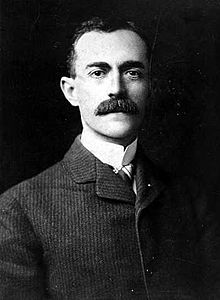Lyman Hall (academic)
| Lyman Hall | |
|---|---|

Lyman Hall circa 1896
|
|
| Born |
February 18, 1859 Americus, Georgia |
| Died | August 16, 1905 (aged 46) New York |
| Fields | Mathematics |
| Alma mater |
Mercer University West Point |
| Known for | President of Georgia Tech |
Lyman Hall (February 18, 1859 – August 16, 1905) was a professor and president of the Georgia School of Technology (now called the Georgia Institute of Technology, commonly referred to as Georgia Tech). He is perhaps best known for bringing what is now the School of Materials Science & Engineering to Georgia Tech. Hall's administration also introduced degrees in electrical engineering and civil engineering in December 1896, textile engineering in February 1899, and engineering chemistry in January 1901. Hall died in 1905, reportedly due to the stress of fundraising for a new chemistry building which now bears his name.
Born in 1859 in Americus, Georgia, he attended Mercer University in Penfield, Georgia. He was admitted to the United States Military Academy in 1877, and graduated in 1881. Due to a physical disability, he was unable to have a military career; instead, he taught mathematics at the Georgia Military Academy in Kirkwood, Georgia for two years and subsequently at the South Carolina Military Academy in Charleston, South Carolina (now known as "The Citadel") from 1883 to 1886. He was then a professor at the Moreland Park Military Academy before Georgia Tech recruited him.
In 1888, Captain Lyman Hall was appointed Georgia Tech's first mathematics professor (and consequently head of the school's mathematics department). He had a solid background in engineering due to his time at West Point and often incorporated surveying and other engineering applications into his coursework. He had an energetic personality and quickly assumed a leadership position among the faculty. At the first faculty meeting on October 5, 1888, he was elected secretary. On June 25, 1895, Professor Hall was invited to speak to Georgia Tech's board about the school's needs. While there were no recorded minutes, subsequent board actions suggest that he recommended the construction of on-campus dormitories to reduce disciplinary problems, and a more proactive recruitment of students.
...
Wikipedia
